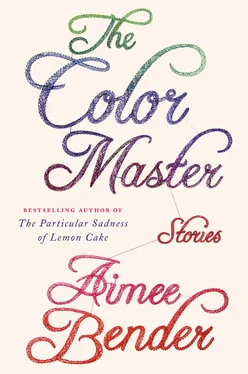The secretary thought of several things. Which was it? The older woman leaned in. “With the mouth,” she whispered, tapping her chin with a long red fingernail. “Just that.
“He never allowed it. He did let me once, and then he insisted on serving me repeatedly for days. It was very pleasant for me,” she said. “Were you similarly treated? You’re awfully young.”
The secretary frowned. “No,” she said. “He was only an acquaintance.”
“Is he dead?”
The secretary picked at the old chocolates in a silver dish between them, their corners whitened and chalky with time. She removed one and took a cautious bite. Crystallized maple sugar inside.
“Yes,” she said. “I’m sorry. I should’ve said so earlier.”
The cat closed its eyes, and no one took a sip of anything, and the sugar was sticky and too sweet in the secretary’s mouth.
The older woman reached out a hand and put it on the secretary’s elbow. It was a light touch, but there was something else in it. “Let me show you something,” she said. She lifted the cat onto her shoulder and led the younger woman into her bedroom, which smelled musty, windows shut forever, and even with the lamp lit, had an undefeatable dimness. No direct sunlight, only the reflection of it off the building’s bricks next door. It made the secretary instantly weary.
The older woman knelt, and from a drawer next to her bed removed a small gold locket. Inside was a lock of hair.
“It’s my hair,” she said. “Not Hans’s. I soaked it in a deadly poison. Hair is porous. Had I needed to, I would’ve eaten it and died. We all had to have a plan.”
“How old were you? Can a person eat hair?” asked the secretary, who stood awkwardly by the bed, and felt that she was being lied to.
“Of course,” said the woman, dangling the hair over her mouth. “You young people don’t understand. You think all poison is in a bottle. I was a very bright child.”
“I am trying,” said the secretary, “it’s just—”
“Look,” said the woman, waving the hair. “Look, yes?”
And because she knew she was supposed to, the secretary stepped up and pushed down the older woman’s hand, though she was tempted to let the woman eat the hair, to call the bluff, to shut down the opera. By her estimation, the woman had probably been five years old during the height of the war. Listening to panicked voices in the next room. The majority of the living memories now owned by then-children.
The older woman began laughing; her shirt had lost its top button, purposefully or not, and you could see her skin under the luminous blouse, the settled wrinkles, the breasts, which struck the secretary as almost intolerably lonely.
“Hans was lousy,” said the woman, slipping the hair back into the locket. “He was lousy and he was wonderful. He was lousy, he was wonderful, and he was a self-centered bastard.”
She clipped the locket shut and announced that the secretary was no fun. “You should be wearing more textures,” she suggested. “Your face is too plain for standard cotton.” She stood and rummaged in her closet and returned with a brightly colored silk-and-sheep’s-wool scarf, tasseled at the ends. “Wear it,” she said. The secretary waved her hand. “Wear it,” said the woman. The secretary opened her mouth to protest, and the woman said: “Put it on, or I will call the police and tell them that you broke into my apartment.”
So it was that the secretary left the building, her coppery hair wrapped in the burgundy, ochre, and forest-green scarf, which did become her small precise features, and which did protect against the cold creeping in from the north in a streamy wind. She knew nothing new about Hans except that he did not invite fellatio when he was a young man and he had loved a woman as flamboyant in her inventions as he. They both had been so young. It said very little to her. Now she had a new scarf and a strange feeling in her hands and thoughts, as if the poison had somehow crept from the woman’s lock of hair into her, and so, when she was suitably far away, she found the first person who looked cold, handed her the scarf, and said take it, and that person, whoever it was, took it, because it was gorgeous, and because it was warm.
The secretary’s own family had survived the war, but barely. All her men had slotted into different ages than were required. They did not have to fight; they were either too old or too young. Her grandfather, her father, her brother, her first love. This generational split freed them all from making any of the torturous decisions that Hans Hoefler had made for himself regardless. They formed their identities in the negative space instead.
4.
The judge’s secretary was typing one day, details about a couple out walking who had been robbed at gunpoint, a fairly unusual crime for these quiet streets, when she received a call. “I hear you want information on Hoefler,” a man’s voice said.
She held her fingers above the keyboard, as if typing would scare off the voice. “Yes,” she said. “Please.”
“Meet me at the cemetery,” he told her. “Twenty minutes.”
“Which cemetery?” she asked, but she knew as soon as she said it, and the man had hung up. It was only a five-minute walk, and Hans was buried there.
She finished up the tail end of the report, swallowed herself inside her coat, and walked the ten blocks east, past the pawn shop and the bakery that specialized in crusty rolls soaked in chicken fat and sesame seeds. When she arrived at Hans’s grave, apprehensive, holding out her sharpest key just in case, she saw from a distance a man in a wheelchair with no hair on his head, wheeling past the headstones over the small green hills. She lowered the key. The air was chilly but clear, a good day to be outside. As the man drew closer, she saw he had no eyebrows, no eyelashes, and that he looked over seventy. She watched him navigate the bumps of grass. He did not look like the kind of man who would appreciate an offer of help.
Nearby stood other mourners, and even through the cold, she could smell the hints of the first dandelion tufts pushing their way to the surface. The man wheeled right up to Hans’s headstone and nodded at her. His face was geometrically compelling, with its triangular cheekbones and rectangular forehead. She waited for him to speak.
The man thanked her for meeting him. He said he was Hoefler’s brother. His older brother. He inquired after her interest and she explained that it was not professional. “I just think about him,” she said. “I’m not sure why.”
The man in the wheelchair sniffed in assent. “Good,” he said. “Then I would like you to know a few things.” He dusted his hands on the wheels of his chair, a gesture she could tell he did often. He kept his gaze on the headstone.
“When I was thirteen and Hans nine,” he began, in a voice louder than was necessary, “I told him my mind was stronger than his. We had been fighting often, or I had been fighting and he had been silent, and I was tired of it, so I sat him down and told him to try to hurt me with his thoughts. He was not a violent young man, and I could see he was uncomfortable, but he tended to do anything I asked, and he stared at me willingly. Even then, he had eyes very big and dark and more like a dog’s than a man’s. You recall?” He glanced up and the secretary nodded. She recalled very well, she said.
“You were his lover?” the man asked, lips harsh.
For the second time that month, the woman shook her head. “I was really only a distant acquaintance,” she said.
“To be stared at by Hans,” the man continued, “made you want to feed him soup, not harm him. Hans thought for a long period of time, and finally took a breath and said he wished I would not always have the first glass of juice. I told him that was an idiotic curse. Almost embarrassing. Just who was this brother of mine, so shiftless in his negativity? I’d been the clear favorite of both our parents and I’d gotten all the extra gifts and sweets. I’d never caught Hans looking at me with any kind of hatred or envy, something I found disconcerting. He tried again, and said that perhaps one day I might lose all the hot water while I was inside the shower, covered with soap. I believe then I reached out and hit him. ‘Come on, brother!’ I said. ‘Curse me! Curse me flat out!’ ”
Читать дальше












